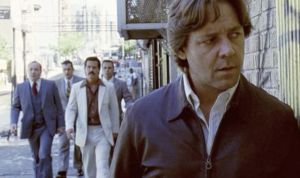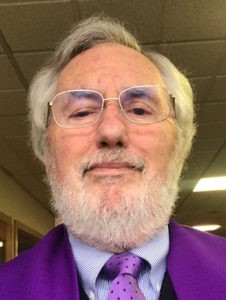Is lying wrong? The question would have seemed impossible even 50 years ago. Now, the ninth commandment becomes expendable: “You shall not bear false witness.”
If, as philosophers insist, we live in a post-truth age, we also live in the age of the lie. Richard Harvey Brown observed that the seven cardinal vices have become seven lively capitalist virtues. Add lying to the list of vices transformed into virtues.
This produces a moral conundrum for Christians. Once there was an evangelical movement that brought honor to Christianity. This movement worked for women’s rights, working men and women, the poor, the immigrants, the homeless and the “least of these.” This movement dedicated everything to a gospel message that every human being is “salvable” by the grace of God. They incorporated the Social Gospel into the fabric of their being. The poor shall be blessed. The meek shall inherit the earth.
And yet when the allure of secular political power came, the leaders of the evangelical movement betrayed it all. These men embraced the Big Lie, the lying-est political candidate in American history — and the lie that America is God’s chosen nation — to have a seat in Washington, D.C.
All those thousands of sermons, all those doctrinal lessons, all those prayers of repentance and contrition undone by a new allegiance to lies, lies and more lies.
“There is no word from the Lord in the land of lies.”
There is no word from the Lord in the land of lies. People search from sea to shining sea, but they can’t find the word of the Lord.
A people of “unclean lips” dominates the anchor institutions of our democracy. Political leaders lie for the fun of lying, even when there’s no reason to lie. When a politician lies to everyone, insults everyone, we have a problem.
We’re living in a time filled with lies — political lies, religious lies, conspiracy theories, corporate lies, advertising lies, personal lies. We live in an age when people know they are lying, and they keep lying.
The lie has trumped the truth. Many seem to feel a freedom from truth itself, cut loose from the foundations of moral life. Like teenagers raised in a strict moralistic home who go to college and go “wild,” Americans set free from the constraints of truth fall for every lie they hear.
The leader who gets away with lying can be projected as strong. Lying becomes a weapon borrowed from the devil to defeat the enemy. If this is true, we are dangerously close to a neo-fascist situation now. When there is a public despising of the truth — of the habit of truth-seeking and truth-telling — we have turned lying into a virtue.

Russell Crowe as Richie Roberts in “American Gangster.”
In the movie American Gangster, Newark detective and aspiring lawyer Richie Roberts is ostracized in his precinct after handing in almost $1 million he found in a mobster’s car. At least three times in the movie, Roberts is asked if he actually turned in the money instead of keeping it for himself. No one can believe he would be that honest. We seem to have reached that kind of incredulous atmosphere where people will not believe that a politician would tell the truth. Maria Konnikova, in Politico, reported that candidates for president in 2016 lied 25% of the time. “All politicians lie” became the accepted mantra.
I ask my fellow evangelicals how long this untenable argument will find a home in your cathedrals where we claim to speak the truth of God.

Assassin’s Creed
The evangelical world looks more and more like “Assassin’s Creed,” an open-world action-adventure stealth video game franchise. The Assassin’s Brotherhood philosophy is that nothing is true, but everything is permitted. Since the foundations of society are fragile, anything can be altered by one’s actions, so long as an individual is willing to accept the consequences of those actions.
Our national politics is awash in lies from shore to shore — liberal lies, conservative lies, conspiracy theories. We are a people of lies living in a land of lies. Isaiah’s people of “unclean lips” looks more like us than ever.
 In the corporate world, there’s a paradox known as the trip to Abilene. It is the story of a family that makes a drive to Abilene, Texas, in the middle of a hot summer, in an un-airconditioned Buick. The trip is an unmitigated disaster. When the family finally returns and truth hits the floor, it turned out that no one wanted to go to Abilene. The corporate trainer who tells this story gives the example of a corporate executive who leads his company to invest in turning peanut oil into jet fuel. When everyone finally admits that no one thought this was a good idea, millions of dollars have been wasted. Welcome to Abilene!
In the corporate world, there’s a paradox known as the trip to Abilene. It is the story of a family that makes a drive to Abilene, Texas, in the middle of a hot summer, in an un-airconditioned Buick. The trip is an unmitigated disaster. When the family finally returns and truth hits the floor, it turned out that no one wanted to go to Abilene. The corporate trainer who tells this story gives the example of a corporate executive who leads his company to invest in turning peanut oil into jet fuel. When everyone finally admits that no one thought this was a good idea, millions of dollars have been wasted. Welcome to Abilene!
Voters either have decided to believe the lies, or they have concluded that it doesn’t matter if a political candidate is lying. In either case, we have entered the dangerous moral ground of saying, “Lying is good” or “Lying is necessary if we are going to save our nation.”
Lying has become a virtue when compared to the “vicious evil” of the liberals, the Democrats, the feminists and the gays. It appears that lying is not only good, but it also wins elections. The downside: It undermines belief in goodness.
“Not so long ago, in American politics, a politician caught lying felt a sense of shame and experienced the loss of his or her career.”
Not so long ago, in American politics, a politician caught lying felt a sense of shame and experienced the loss of his or her career. Our national identity, from the beginning, was based on notions of honesty from our leaders. The “cherry tree” myth of our most eminent founding father, George Washington, has been repeated by generations of students: “I cannot tell a lie.” Another of our greatest presidents was known as “Honest Abe.”
Billy Graham, expressing the heart of many Americans in the 1950s, told Dwight Eisenhower, “I don’t think the American people would be happy with a president who didn’t belong to any church.” God, the flag, honesty, character and the church were part of the American package even if only for the sake of appearances. Honesty and character were expected even if they were not always complete. Some of our leaders have been disgraced and forced out of office by lies or even the suggestion of lying: Richard Nixon, Newt Gingrich, Anthony Weiner. Evangelicals, in particular, have insisted that telling the truth and having high moral character were prerequisites for elected office.
American voters, however, like winning more than they like losing. Under Bill Clinton, the Democrats discovered people didn’t mind if the president had sex with an intern if he kept the economy hot. A president’s personal life didn’t matter. Character wasn’t important.
“The train of permissiveness left the station with Clinton and ran off the rails with Trump.”
So, the Republicans learned a valuable lesson: If you offer to make America great again, you can lie, lie, elect, elect. The train of permissiveness left the station with Clinton and ran off the rails with Trump.
The attitude that “anything goes” can be traced to the political philosophy of liberalism in its recent form. Liberals taught conservatives that we are all imperfect. “I’m only human” became a liberal slogan. “Who am I to judge another person?” These were bad lessons well learned by Republicans who now throw them back in the faces of liberals.
Democrats and Republicans alike concluded that prosperity and popularity mattered far more than promiscuity and prevarication.
This has landed us in a situation where a politician lies, his advisers and publicity handlers repeat the lie and tell additional lies. When confronted with the lies, they defend the lies. As a politician continues to get away with lying, the lies become larger, bolder and more blatant. The new bottom line is that a politician only needs to be open and honest about his lying.
The followers of the lie reach a point of no return. While the leader is telling lies, the lies enhance his position as the best leader and call upon the followers to demonstrate their commitment to him by continuing to believe his lies despite evidence to the contrary. Followers must swallow the lie and accept the illusion that the leader is flying by the seat of his pants, making stuff up and lying through his teeth for the good of the nation.
“The new bottom line is that a politician only needs to be open and honest about his lying.”
So, where does this leave us? There are at least two elements to lying. One focuses on the short-term gains for the party in power. The other, longer road waits for the inevitable unraveling of the lie as people grow tired of lies.
The foundation of political power rots from within, and the entire scaffolding of lies disintegrates.
Evangelicals have a way to save us all, and only a true evangelical moment can save us. The gospel word that initiates our salvation is “repentance.” The alternative to lying and false witness is called metanoia in the New Testament, “repentance,” literally “change of mind.” Or in the Hebrew Scripture, “turn,” a change of direction.
In the emotion of this moment, only a mixed metaphor will suffice: We can find our way out of the swamp of lies that pile up like the dry bones in the valley of death. We can know the truth and the truth will set us free. We can speak the truth in love. As a people of truth, evangelicals, of all people, should come home from the dry rot of the political wilderness.

Rodney Kennedy
Rodney W. Kennedy is a pastor in New York state and serves as a preaching instructor at Palmer Theological Seminary. He is the author of nine books, including the newly released The Immaculate Mistake, about how evangelical Christians gave birth to Donald Trump.
Related articles:
Speaking truth to power means denouncing lying politicians and their preachers | Opinion by Wendell Griffen
Truth Decay: How lies prepare the way for evil | Opinion by David Gushee
‘A democracy can die of too many lies,’ warns broadcasting legend Bill Moyers


